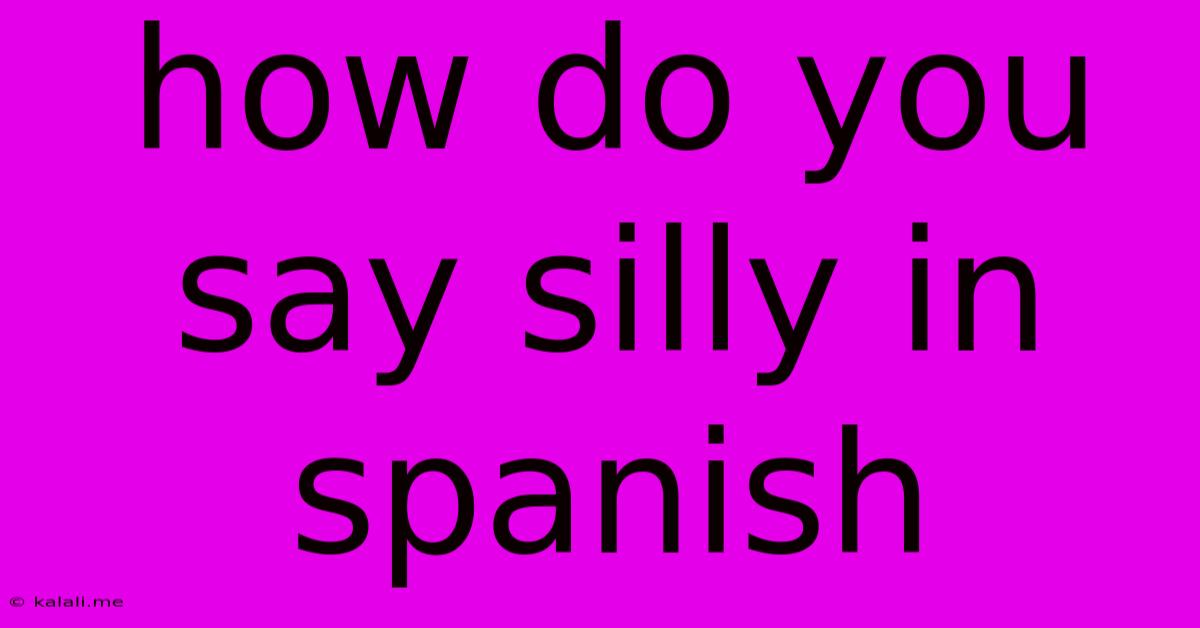How Do You Say Silly In Spanish
Kalali
Jun 08, 2025 · 3 min read

Table of Contents
How Do You Say Silly in Spanish? A Guide to Different Nuances
So, you're looking for the Spanish equivalent of "silly"? It's not quite as straightforward as a one-to-one translation, as the best word depends heavily on the context. This article will explore various options, helping you choose the perfect word to convey the right shade of meaning. We'll cover common words, informal options, and even some regional variations.
This guide will explore several Spanish words for "silly," considering various connotations like foolishness, silliness, absurdity, and even a bit of mischievousness. Understanding the subtle differences will elevate your Spanish skills and ensure your communication is precise and effective.
Common Ways to Say Silly in Spanish
The most common and versatile translation of "silly" in Spanish is tonto/tonta. This word is gendered, with tonto used for masculine nouns and tonta for feminine nouns. It generally implies a lack of intelligence or common sense, sometimes with a touch of harmlessness. Think of a child acting foolishly – tonto/tonta would fit well.
Another frequently used word is bobo/boba, also gendered. Similar to tonto/tonta, it describes someone acting foolishly or lacking intelligence. However, bobo/boba often carries a slightly gentler, more endearing connotation. It might be used to describe a clumsy or playful act rather than outright stupidity.
For something more playful or mischievous, consider using chistoso/chistosa. This word translates more closely to "funny" or "silly" in the sense of being amusingly quirky or playful. It doesn't necessarily imply a lack of intelligence.
Expressing Silliness in Different Contexts
The best choice of word depends heavily on context. Consider these scenarios:
-
A silly mistake: You could use tontería (feminine noun, meaning silliness or foolishness) to describe a silly mistake. "Cometí una tontería" translates to "I made a silly mistake."
-
A silly joke: Chiste (noun, meaning joke) would be appropriate here. You can describe a silly joke as a chiste tonto (silly joke) or a chiste bobo (silly joke).
-
A silly person: The best choice would depend on the type of silliness. If it's harmless and playful, bobo/boba or chistoso/chistosa might be suitable. If it suggests a lack of intelligence, tonto/tonta would be more appropriate.
-
Silly behavior: For silly actions, you can use phrases like actuar como un tonto/una tonta (to act like a fool), hacer tonterías (to do silly things), or hacer el bobo/la boba (to act silly).
Regional Variations and Informal Language
While the words mentioned above are widely understood, regional variations exist. Some slang terms might be more common in certain areas. Always consider your audience and the level of formality required.
For example, some informal terms might include:
-
Gilipollas (masculine): This is a very strong and offensive term, meaning "idiot" or "fool." Use with extreme caution.
-
Imbécil: Another stronger term, meaning "imbecile" or "idiot," also not suitable for most everyday conversations.
Conclusion: Choosing the Right Word
Choosing the right word to convey "silly" in Spanish requires understanding the nuances of each term. Consider the context, the level of formality, and the specific shade of meaning you want to express. Remember to choose your words carefully and avoid offensive terms unless the context specifically requires it. Using the words and phrases suggested above will significantly improve your Spanish communication skills and help you navigate the intricacies of translating subtle concepts. Remember to practice and gain familiarity with these diverse options!
Latest Posts
Latest Posts
-
What Can I Substitute Vegetable Oil For In Brownies
Jun 08, 2025
-
Can You Run Extension Cord Through Wall
Jun 08, 2025
-
How To Loosen Oil Drain Plug
Jun 08, 2025
-
Assigning A List To Another List C
Jun 08, 2025
-
Algorithm For Scrambling A Rubiks Cube
Jun 08, 2025
Related Post
Thank you for visiting our website which covers about How Do You Say Silly In Spanish . We hope the information provided has been useful to you. Feel free to contact us if you have any questions or need further assistance. See you next time and don't miss to bookmark.